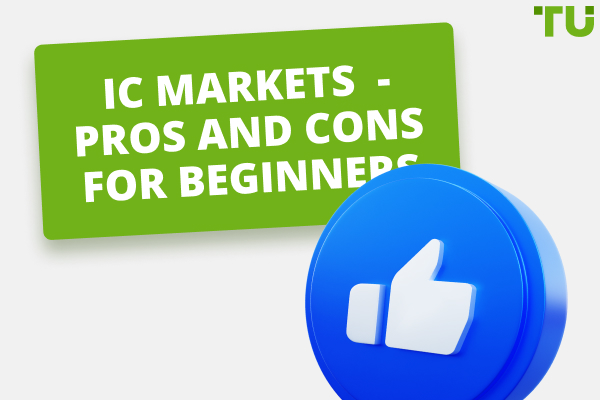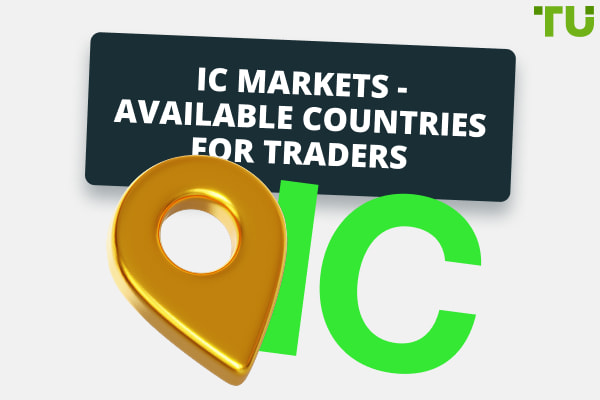
IC Markets Alternatives
IC Markets has gained considerable popularity within the trading community over the past few years, and while one can begin their trading journey through this broker, some decent IC Markets alternatives must be considered before making the final decision. So, the Traders Union has prepared this IC Markets alternatives review that will help traders identify other comparable brokers, draw a comparison, and answer some basic questions such as: is IC Markets a good broker for stock trading?
IC Markets: Pros and Cons
In this review, the experts at TU have curated the major pros and cons of IC Markets as a broker, its best alternatives, a score-based matrix for those alternatives, and an in-depth comparison of the available options concerning key areas including regulation, trading conditions, and fees, among others.
IC Markets is an Australia-based broker founded in 2007 that offers contract-for-difference (CFD) trading services for a variety of underlying assets like bonds, stocks, cryptocurrencies, indices, commodities, forex, and futures. It claims to have 180,000+ active clients worldwide along with a trading volume of $1.11 trillion for the month of March in 2023. The following are the pros and cons of IC Markets:
IC Markets Pros
Offers Leverage
The platform allows its users to trade with a leverage ratio of 1:2 for almost all the assets. This ratio can even go up to 1:30 for some forex pairs. Users can take advantage of this feature to enter into larger trades with relatively lower capital.
Competitive Spreads
A spread (in trading terms) is the difference between the dealer’s bid and the ask for the same security. It is a source of implicit cost for traders, so narrower spreads are preferred over wider ones. IC Markets claims to have competitive spreads with some beginning from 0.0 pips.
IC Markets Spread and Fees ExplainedGood Trading Platform
IC Markets employs the MetaTrader 4 and 5 platforms which fall into the category of most renowned trading platforms across the world. According to experts, these platforms are seamless and flexible when it comes to the trading of futures, forex, stocks, and CFDs.
Good Reviews
IC Markets has scored a rating of 4.9 out of 5 based on 23,500+ ratings on the popular review website Trustpilot.
Competitive Fees
The trading commissions charged by IC Markets are relatively lower compared to other brokers, particularly for forex.
IC Markets Cons
Lack of Trading Assets
The range of assets available for trading on the platform is relatively lower compared to other brokers. This could leave users with only a selective pool of assets to trade in.
High Reliance on CFDs
Most of the assets available for trading on IC Markets are in the form of CFDs. This means that users do not have the choice of trading the assets directly.
Best IC Markets Alternatives
The experts at TU have identified the following two brokers as the best alternatives for IC Markets:
Tickmill
Tickmill is a broking platform founded in the year 2014. The following are some key features concerning this platform:
Minimum initial deposit of $100
Leverage of up to 1:20
Spreads starting from 0.0 pips
Relatively lower spreads compared to IC Markets
Relatively younger compared to IC Markets
eToro
eToro is a broking platform founded in the year 2007. The following are some key features concerning this platform:
Minimum deposit of $50
Support for direct trading in assets
Support for CFD trading
Offers copy trading facility
Free stock and ETF trading
Customer support only available via email
IC Markets vs eToro Vs Tickmill - Total Score
| Feature | IC Markets | eToro | Tickmill |
|---|---|---|---|
| Overall | 4.7 | 4.3 | 4.6 |
| Regulation | 5 | 4.6 | 4.9 |
| Fees | 4.9 | 4.5 | 4.9 |
| Trading Assets | 4.6 | 4.7 | 4.1 |
| Investment Instruments | 4.9 | 4.8 | 3.9 |
| Platforms and Charting Tools | 4.4 | 3.7 | 4.2 |
| Deposit and Withdrawal | 4.6 | 4.5 | 4.5 |
| Research | 4.3 | 5 | 4.2 |
| Education | 4.4 | 3.9 | 4 |
| Support | 4.6 | 4.1 | 4.5 |
| Read review | Read review | Read review |
Based on a poll of experts, TU has gathered the following scores for each platform in the concerned areas. Results show that IC Markets is the best broker overall with core strengths being its regulation, investment instruments, and customer support. It has performed decently in almost all aspects that were scored. Tickmill is the second-best broker overall with core strengths being its regulation and fees, and weak points being the investment instruments offered. eToro’s core strengths are its trading assets and research while its weak points include a lack of charting tools and educational support for users. Compare also IC Markets and FXTM to make the best choice.
IC Markets vs eToro Vs Tickmill – Regulation
| Regulated By: | IC Markets | eToro | Tickmill |
|---|---|---|---|
| US Regulation | No | Yes ( FINRA) | No |
| FCA (Great Britain) | Yes | Yes | Yes |
| CySec (Cyprus, EU) | Yes | Yes | Yes |
| ASIC (Australia) | Yes | Yes | No |
| Other Regulators | AFCA (Australia) | Seychelles FSA | FSCA (Seychelles), Malaysia |
Regulation is an important consideration when it comes to choosing your broker. A highly-regulated broker is more reliable and reduces counterparty risk. The following table compares the three brokers in terms of regulation. Results show that eToro and IC Markets are more regulated compared to Tickmill. Compare IC Markets and Fullerton Markets to make the best choice.
Is IC Markets Regulated? Is it Legit or Scam?IC Markets vs eToro Vs Tickmill - Trading Conditions
| Trading Conditions | IC Markets | eToro | Tickmill |
|---|---|---|---|
| Minimum Deposit | $200 | $50 | $100 |
| Trading Platforms | MT4, MT5, cTrader | eToro | MT4, MT5 |
| Max Leverage (Futures) | 1-500 | 44682 | 1-500 |
| Supported Markets | Forex, futures, CFDs on indices, commodities, metals, stocks and bonds | Forex, Stocks, Indices, Commodities, Crypto | Forex, CFDs on indices, commodities, crypto, metals, stocks, bonds |
| Trading assets | 2000+ | 1000+ | 200+ |
| Trading Accounts | cTrader, Raw Spread, Standard | Standard, Demo | |
| Base Account Currencies | USD, AUD, GBP, CHF, JPY, NZD, SGD, CAD, HKD, BTC | GBP, EUR, USD, AUD, CAD, NOK, NZD, PLN, SEK, and SGD | USD, EUR, GBP |
The following table compares the three platforms based on their trading conditions like minimum initial deposit, trading platforms, maximum leverage, supported markets, and the number of trading assets, among others. A key point to note here is that eToro offers the lowest minimum initial deposit while IC Markets offers the highest number of trading assets.
IC Markets Minimum Deposit And Payment MethodsIC Markets vs eToro Vs Tickmill Fees
Forex Trading Fees
| Fee | IC Markets | eToro | Tickmill |
|---|---|---|---|
| Standard Account EURUSD Average Spread | 1.2 pips | 1 pip | 1.2 pips |
| Standard Account Fee | $0 | $0 | $0 |
| ECN/STP Account Fee | not offered | Not supported | $2 per lot |
| ECN Account EUR Average Spread | not offered | Not supported | 0.1 pip |
The following is a comparison of the fees charged by the three brokers for forex trading, CFD trading, and non-trading transactions. The forex trading fees are almost similar for all of them with Tickmill being the only broker offering an ECN/STP account. Similarly, each of them offers a floating spread for CFD trading. Tickmill offers the most convenient non-trading fees while the same for eToro and IC Markets are similar. Compare also IC Markets and WelTrade to make the best choice.
CFD Trading Fees
| Fee | IC Markets | eToro | Tickmill |
|---|---|---|---|
| CFD Trading Fee | Floating spread | Floating spread | Floating spread |
Non-Trading Fees
| Fee | IC Markets | eToro | Tickmill |
|---|---|---|---|
| Account Fee | No | No | No |
| Deposit Fee | No | No | No |
| Withdrawal Fee | $20 - just for bank transfer | $5 | No |
| Inactivity Fee | After 12 months of inactivity, 10 units of your account’s currency denomination | $10 per month after 12 months of inactivity | No |
Best IC Markets Alternatives – Conclusion
IC Markets is a decent broker that offers competitive spreads and fees. However, it lacks in providing direct trading services. It is quite similar to eToro in many aspects of comparison including regulation, fees, and trading conditions, among others. However, eToro has an advantage over IC Markets as it provides support for both CFD and direct trading. Experts suggest IC Markets for traders who wish to trade in CFDs and want to avoid non-trading fees, eToro for traders who are more inclined towards copy trading, and Tickmill for traders looking for lower fees overall.
FAQs
What are ECN/STP accounts?
For ECN (Electronic Communications Network) accounts, the brokers match client orders to execute a trade while for STP (Straight Through Processing) accounts, the brokers execute client orders by passing them to an external liquidity provider.
What is copy trading?
Copy trading entails following a third party’s trades (often an expert) to benefit from their trading expertise and skills.
Should I use leverage?
Leverage is a double-edged sword. If used wisely, it can enhance one’s trading game, and if not, there remains the risk of a capital wipe-out. Experts suggest keeping the use of leverage limited to a certain extent.
Does regulation guarantee safety for my trading activities?
Regulation helps keep checks in place that focus on mitigating various risks involved in trading activities. That being said, it does not guarantee the safety of your trading activities. Experts suggest that regulation reduces risks involved in trading to a considerable extent.
Team that worked on the article
Andrey Mastykin is an experienced author, editor, and content strategist who has been with Traders Union since 2020. As an editor, he is meticulous about fact-checking and ensuring the accuracy of all information published on the Traders Union platform. Andrey focuses on educating readers about the potential rewards and risks involved in trading financial markets.
He firmly believes that passive investing is a more suitable strategy for most individuals. Andrey's conservative approach and focus on risk management resonate with many readers, making him a trusted source of financial information.
Also, Andrey is a member of the National Union of Journalists of Ukraine (membership card No. 4574, international certificate UKR4492).
Olga Shendetskaya has been a part of the Traders Union team as an author, editor and proofreader since 2017. Since 2020, Shendetskaya has been the assistant chief editor of the website of Traders Union, an international association of traders. She has over 10 years of experience of working with economic and financial texts. In the period of 2017-2020, Olga has worked as a journalist and editor of laftNews news agency, economic and financial news sections. At the moment, Olga is a part of the team of top industry experts involved in creation of educational articles in finance and investment, overseeing their writing and publication on the Traders Union website.
Mirjan Hipolito is a journalist and news editor at Traders Union. She is an expert crypto writer with five years of experience in the financial markets. Her specialties are daily market news, price predictions, and Initial Coin Offerings (ICO).












